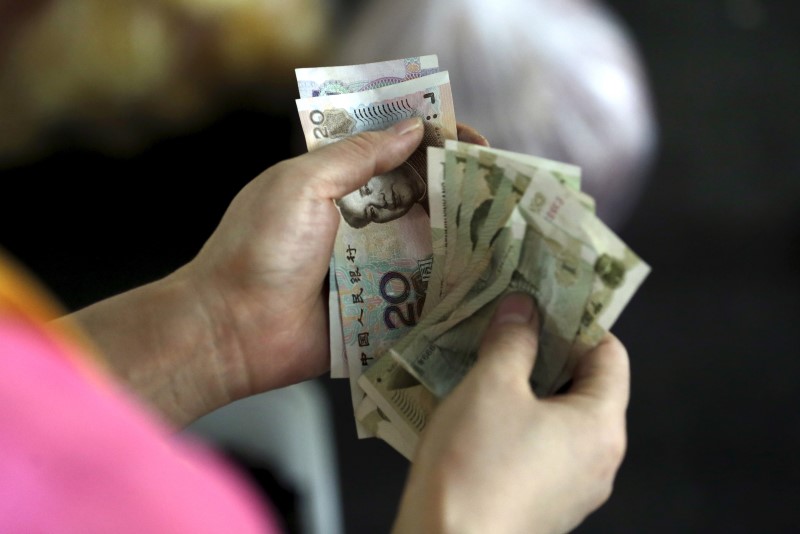SHANGHAI/BEIJING (Reuters) - China's central bank is preparing to raise the reserve requirement ratio for yuan deposits placed in yuan clearing banks from Jan. 25 in its latest bid to stem speculation in the currency, according to three sources who have seen the document outlining the change.
The People's Bank of China (PBOC), which had established the reserve requirement ratio (RRR) for offshore yuan participating banks in 2014, will return the rate to a normal level, the sources said, without specifying what that level would be. It had been set at zero.
The change will also apply to correspondent banks.
Market participants suspect the planned reserve increase is intended to soak up additional liquidity in the offshore yuan, or CNH, market as the PBOC tries to stem speculation of further depreciation in the currency.
In early January, the value of the offshore yuan fell to its lowest since trading began in 2010 -- and well below levels traded inside China -- on fears that Beijing was planning a sharp depreciation in its currency to help boost its cooling economy.
The PBOC has managed to prop the offshore yuan back up in recent weeks through state banks operating in Hong Kong, which have started hoovering up the currency and hoarding it, thus tightening supply.
But the yuan weakened sharply again in international markets on Friday. [CNY/]
By forcing banks offshore to hold more yuan in reserve, it would reduce the amount of the currency available in the market, squeezing supply further and making it more difficult and expensive for speculators.
The costs of borrowing yuan "are set to rise" as a large volume of offshore yuan is actually being deposited back into China, explained an international investment banker who declined to be identified.
"The expectation of yuan devaluation has led to massive remittance of yuan," said China Industrial Bank's chief economist Lu Zhengwei.
"Raising the RRR will increase the cost of arbitrage," Lu said.
"Domestic banks conducting exchanges offshore and remitting yuan to China will be further controlled," Lu said, "pushing up the cost of offshore yuan funding."
Requests to China's central bank for comment went unanswered on Sunday.
Offshore clearing banks located in Hong Kong and Macao, which already maintain deposits with central bank branches in Zhuhai and Shenzhen, will be required to maintain reserves there, according to the sources.
Other yuan clearing banks will be required to maintain the reserves onshore at accounts held by parent institutions.
The PBOC has been under increasing pressure from policy advisers to let the currency fall quickly and sharply, after spending billions of dollars buying yuan over recent months to defend the exchange rate.
Confusion over China's foreign exchange policy and its commitment to reforms has roiled global financial markets in recent weeks as the central bank allowed the yuan to fall and then moved in aggressively to try to stabilise it.
China's foreign exchange regulator has ordered banks in some of the country's major import and export centres to limit purchase of U.S. dollars this month.
China also suspended forex business for some foreign banks, including Deutsche, DBS and Standard Chartered (L:STAN) at the end of last year.

But most analysts and currency traders believe downward pressure on the yuan will persist as the economy slows.